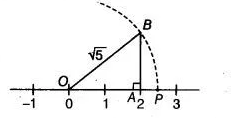Locate $\sqrt{5}, \sqrt{10}$ and $\sqrt{1} 7$ on the number line.
(i) Here, $5=2^{2}+1^{2}$
So, draw a right angled $\triangle O A B$, in which $O A=2$ units and $A B=1$ unit and $\angle O A B=90^{\circ}$ By using Pythagoras theorem, we get
$O B=\sqrt{O A^{2}+A B^{2}}$
$=\sqrt{2^{2}+1^{2}}=\sqrt{4+1}=\sqrt{5}$

Taking $O B=\sqrt{5}$ as radius and point $O$ as centre, draw an arc which meets the number line at point $P$ on the positive side of it.
Hence, it is clear that point $P$ represents $\sqrt{5}$ on the number line.
(ii) Here, $10=3^{2}+1$
So, draw a right angled $\triangle O A B$, in which $O A=3$ units and $A B=1$ unit and $\angle O A B=90^{\circ}$.
By using Pythagoras theorem, we get
$O B=\sqrt{O A^{2}+A B^{2}}$
$=\sqrt{3^{2}+1^{2}}=\sqrt{9+1}=\sqrt{10}$

Taking $O B=\sqrt{10}$ as radius and point $O$ as centre, draw an arc which meets the number line at point $P$ on the positive side of it. The point $P$ represents $\sqrt{10}$ on the number line.
(iii) Here, $17=4^{2}+1$
So, draw a right angled $\triangle O A B$, in which $O A=4$ units and $A B=1$ unit and $\angle O A B=90^{\circ}$ By using Pythagoras theorem, we get
$O B=\sqrt{O A^{2}+A B^{2}}$
$=\sqrt{4^{2}+1^{2}}=\sqrt{16+1}=\sqrt{17}$

Taking, $O B=\sqrt{17}$ as radius and point $O$ as centre, draw an arc which meets the number line at point $P$ on the positive side of it. The point $P$ represents $\sqrt{17}$ on the number line.
